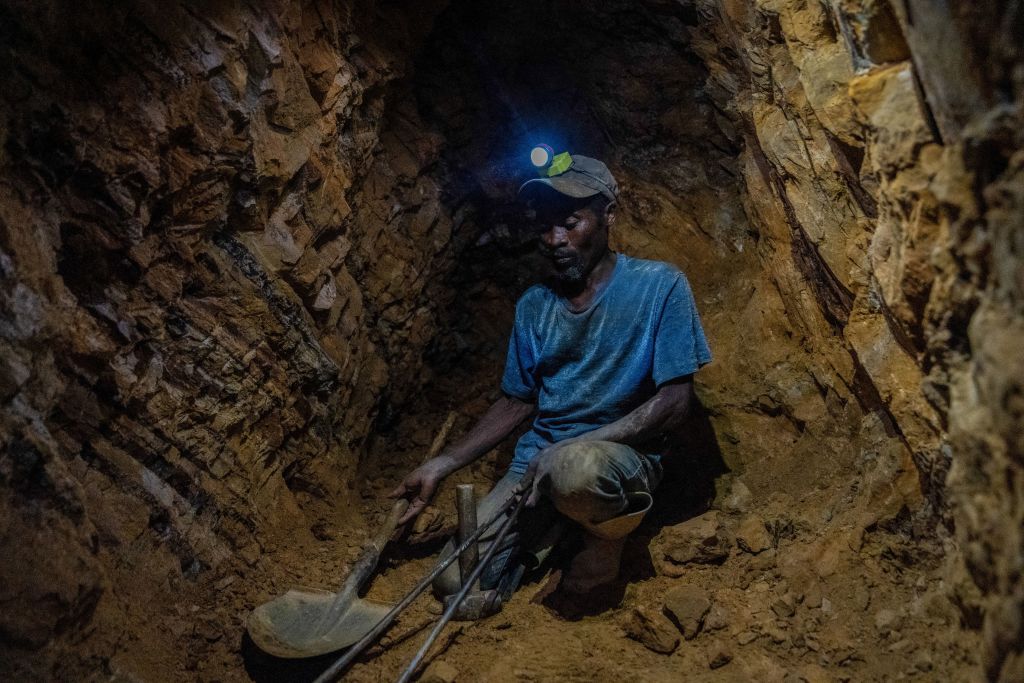ADF STAFF
In the town of Kamituga, in the heavily forested eastern reaches of the Democratic Republic of the Congo, artisanal gold mining is big business. Thousands of people in South Kivu province work in vast open-pit mines in the faint hope of making a few dollars a day.
Chinese companies dominate the industry nationwide. In stark contrast to small-scale miners, Chinese companies take a more industrial approach to gold-mining operations, using heavy machinery such as mechanized diggers and boat dredges.
“[We] don’t have the same means,” Felicien Mikalano, the president of a local association for artisanal diggers, told Agence France-Presse.
According to DRC mining laws, foreigners are not allowed to participate in artisanal mining, but Chinese companies partner with local cooperatives to bypass the ban and avoid paying federal taxes.
The Congolese people and government have grown frustrated with Chinese gold mining companies operating illegally in the east, degrading the environment and abusing African miners’ rights. The environmental impacts of large-scale Chinese mining operations are devastating, as they pollute their communities’ water sources with toxic chemicals such as cyanide and mercury. River dredging also damages water quality and decreases fish stocks.
Large tracts are effectively destroyed by mining, as fertile soil, forests and other plant life are laid barren. One South Kivu mining site that began operating in 2019 near Kitumba lost about 82 hectares of tree cover by June 2023, according to gorilla conservation nonprofit Berggorilla & Regenwald Direkthilfe.
Gold production in South Kivu soared from 42 kilograms in 2022 to more than 5,000 kilograms in 2023, roughly one-sixth of the official national production. Gold exports in the DRC are systematically underreported, however, as metric tons are smuggled into global supply chains through its neighbors to the east.
Hundreds of foreign companies, most of which are Chinese owned, mine gold in South Kivu. Local authorities say they operate without permits, do not report their profits, and frequently keep government officials and journalists away with armed guards.
“It is difficult to monitor these companies,” inspector Ghislain Chivundu Mutalemba told AFP. “These Chinese partners mine, [and] the cooperatives sell the product over the counter. We don’t know what percentage the Chinese take, or how much they produce.”
Children are among the local miners who work long hours in dangerous conditions, giving what few grams of gold they find to the owners of the mines who sell to traders. Although it is unclear what the miners are paid, local authorities have said it is always far below global prices for gold.
South Kivu communities complain that they see few if any advantages from the mining industry.
“We miners are very angry because we mine minerals and we die in the process, but we don’t see any benefits for society, not just here in Kamituga but throughout the country, everywhere in Congo,” Deogratias Mutekulwa told AFP. “We don’t see how minerals help development.”
In July, South Kivu Gov. Jean-Jacques Purusi Sadiki suspended all “illegal” mining activities in the province and ordered companies and operators to leave mining sites. He said the decision was made due to “disorder caused by the mining operators” as well as a need to improve “the traceability of mineral production in these sites.”
“According to surveys, these companies mine at least 100 kilos of gold per month, per company,” he said in an interview with AFP. “All that gold doesn’t come through here. It goes straight from Rwanda.”
Congolese Minister of Mines Kizito Pakabomba recently said the DRC wants to make “strategic choices” about the companies who run the country’s mines. It is seeking new investors as it looks to shift an industry that currently is dominated by China. Pakabomba cited the DRC’s decision in August to stop the proposed sale of a Congolese copper and cobalt mining company called Chemaf Resources to China’s Norin Mining, saying that if Chemaf remains set upon an ownership change, “we’ll consider with them the different options that could be taken.”
“[We want to] attract better investors, more investors and diversified investors,” he said in an interview, according to an October 9 Bloomberg article.

